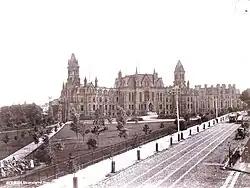37th Street station, also known as 37th Street/Spruce Street/Woodland Avenue station, is a SEPTA subway–surface lines trolley station in Philadelphia. It is westernmost station of the subway–surface tunnel and carries Routes 11, 13, 34, and 36. The station is located on the campus of the University of Pennsylvania at the intersection of 37th and Spruce streets.
Trolleys serving this station go eastbound to Center City Philadelphia and westbound to the neighborhoods of Eastwick and Angora, as well as the Delaware County suburbs of Yeadon and Darby.
History

The station was opened in November 1955 by the Philadelphia Transportation Company (PTC) as part of a larger project to move portions of the elevated Market Street Line and surface trolleys underground.[1] The original project to bury the elevated tracks between 23rd to 46th streets was announced by the PTC's predecessor, the Philadelphia Rapid Transit Company (PRT), in the 1920s, but was delayed due to the Great Depression and World War II.[2] The PTC's revised project also included a new tunnel for trolleys underneath the campus of the University of Pennsylvania, continuing from the original western portal at 23rd and Market streets to new portals at 36th and Ludlow streets and 40th Street and Baltimore Avenue.[2]
The station's platforms are offset because during construction, the above intersection was a five-way junction between Spruce Street, Woodland Avenue, and South 37th Street. The latter two streets were later converted to pedestrian walkways.
In October 2006, Penn's class of 1956 donated a new covered headhouse for the eastbound platform entrance. The entrance is a replica of the Peter Witt trolley manufactured by J. G. Brill Company from 1923 to 1926 for Philadelphia's trolley system.[3] The replica was built by the Gomaco Trolley Company.[4]
Station layout
The station has two low-level offset side platforms, each capable of platforming two trolleys at a time. Fares are collected on board the trolley cars.
| G | Street level | Entrance/exit, buses |
| P Platform level |
Side platform, doors open on the right | |
| Westbound | ← Routes 11, 13, 34, 36 toward West Philadelphia (40th Street Portal) | |
| Eastbound | Routes 11, 13, 34, 36 toward 13th Street (36th Street) → | |
| Side platform, doors open on the right | ||
References
- ↑ Puckett, John L. and Mark Frazier Lloyd. Becoming Penn: The Pragmatic American University, 1950–2000, p. 35, at Google Books, accessed May 31, 2020.
- 1 2 John L. Puckett. "Putting the Market Street Elevated Underground". West Philadelphia Collaborative History. University of Pennsylvania Graduate School of Education. Retrieved June 2, 2020.
- ↑ "Class of 1956 Trolley / 37th & Spruce @ Woodland Avenue". University of Pennsylvania. Archived from the original on 2008-04-02. Retrieved July 30, 2012.
- ↑ "'Trolley' Subway Entrance – October 2006". Gomaco Trolley Company. Archived from the original on February 24, 2012. Retrieved November 26, 2012.
External links
 Media related to 37th Street tram stop (Philadelphia) at Wikimedia Commons
Media related to 37th Street tram stop (Philadelphia) at Wikimedia Commons- SEPTA – 37th Street station
- Images from NYCSubway.org
- Northwest entrance from Google Maps Street View

